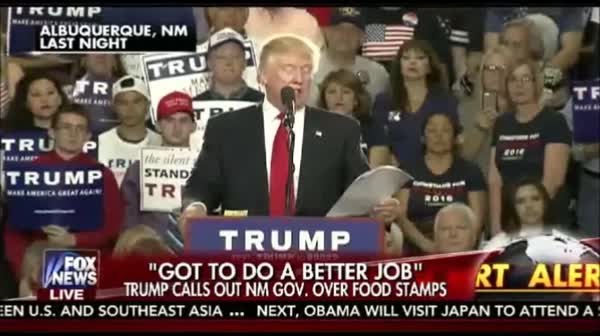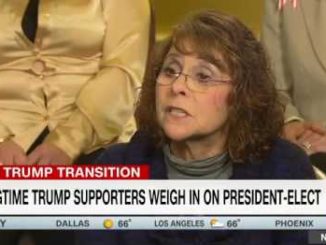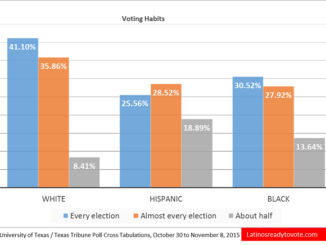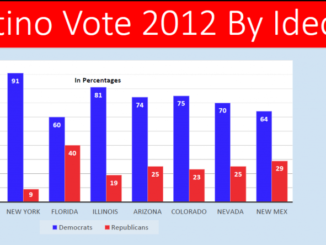
by Beth Reinhard, WSJ
Donald Trump’s criticism of the nation’s first Latina governor threatens to further damage his image in the Hispanic community as he turns toward a general election where those voters will be pivotal.
At a rally in Albuquerque on Tuesday night, the presumptive GOP presidential nominee pointed to a rise in food stamp recipients under New Mexico Gov. Susana Martinez, who heads the Republican Governors Association. “She’s gotta do a better job,” he said.
On Wednesday in Southern California, Mr. Trump invoked the name of a San Francisco woman killed last year by an illegal immigrant. “Build that wall! Build that wall! Build that wall!’’ the crowd chanted.
Mr. Trump’s appearances in two of the three states with the largest Hispanic electorates follow a few initial overtures to Hispanic voters in recent weeks that have drawn mixed results. The Pew Hispanic Center estimates a record 27.3 million Latinos will be eligible to vote in 2016 and would make up about 12% of the electorate, up from 10% in 2012.
Mr. Trump’s campaign didn’t respond to questions about whether he planned to hire campaign staffers focused on Hispanic outreach to improve his large deficit with that group in polls.
“I’ve never liked the pandering game, but I’ve never seen someone do it so antagonistically,” said Republican state Rep. Rod Montoya of Farmington, who plans to vote in New Mexico’s June 7 primary for Texas Sen. Ted Cruz even though he has dropped out of the race. Mr. Trump, he added, “is not helping his cause.”
At both rallies this week, Mr. Trump said his appeal is growing as Hispanic voters learn about plans to create jobs and prosperity. “We’re going to win with Hispanics,” Mr. Trump told the ethnically diverse crowd of thousands at the Albuquerque Convention Center. “They don’t want their homes taken away and they don’t want their jobs taken away.”
But some Hispanic leaders say Mr. Trump first must apologize for branding Mexican immigrants as criminals in his campaign announcement and making other inflammatory remarks before they would be open to hearing his campaign agenda.
Mrs. Martinez didn’t attend the rally. Her spokesman, Mike Lonergan, said Wednesday “the governor will not be bullied” into backing him. The governor “cares about what [Mr. Trump] says he will do to help New Mexicans. She’s disappointed that she didn’t hear anything about that last night,” he said in a statement.
On the Mexican holiday of Cinco de Mayo earlier this month, Mr. Trump posted on Twitter a picture of him eating a taco bowl and wrote, “I love Hispanics.” This past weekend, he sent a video to a gathering of the National Hispanic Christian Leadership Conference in which he said, “National…Hispanic…Christian…. three great words!”
These gestures “did not help, whatsoever,” said the Rev. Samuel Rodriguez, president of the nation’s largest Hispanic Christian group, which is nonpartisan. “If Donald Trump wants to redeem himself with Hispanic voters, he has to engage in a mea culpa for the demagoguery and hyperbole.”
Darrell Scott, a Cleveland pastor serving as chief executive officer of the National Diversity Coalition for Trump, a multiethnic and multiracial group, defended Mr. Trump’s unscripted approach in the video. “He’s not pandering. It’s genuine,” he said. “He is authentic, and that’s what resonates with the American people.’’
Mr. Trump has flagged illegal immigration as a pressing problem and said he would deport millions of undocumented workers and force Mexico to pay for a wall along the border.
“He’s not anti-immigrant. He’s anti-illegal immigrant,” said Dahlys Hamilton, who started an Atlanta-based group called Hispanic Patriots for Trump. “People don’t know that because they are too busy spinning rhetoric that he’s a racist.”
She also belongs to the National Diversity Coalition for Trump, which is organizing gatherings for the presumptive GOP nominee. The group doesn’t include any of the major Hispanic surrogates for Republican nominees Mitt Romney and John McCain or former President George W. Bush.
“ Hillary Clinton is a seasoned politician, and it will probably be a good idea for Trump to look to who would be respected in the Hispanic community to lean on,” said Debe Campos-Fleenor, a Mexican-American insurance agent in Tucson, Ariz., who belongs to the pro-Trump coalition.
Mrs. Clinton has about a half dozen staff members devoted to Hispanic outreach and media and is backed by a grass-roots group called Latinos for Hillary that launched in October. She also has a team of high-profile Hispanic surrogates, including members of Congress and cabinet secretaries, who are regularly booked on Spanish-language media.
Mrs. Clinton’s efforts to make inroads with Hispanic voters began months ago. She has stumped on behalf of President Barack Obama’s executive orders protecting some illegal immigrants from deportation. The campaign has organized “Latina-to-Latina” phone banks, “Mujeres in Politics” meetings for women, Hispanic debate watch parties and other events in Texas, Arizona, Colorado and Florida.
State Rep. Alonzo Baldonado, who represents a district south of Albuquerque, said he would support Mr. Trump “because I’m a Republican and I am going to support the nominee.” He added that he agrees with Mr. Trump’s emphasis on national security.
“I have Hispanic constituents who are solid Donald Trump supporters, and I have those who are telling me they could never support him,” he added. “I’ve also had people tell me not to endorse Trump because I will lose support for my own campaign.”
So far, Hispanic voters have a very negative view of Mr. Trump, a Wall Street Journal/NBC News survey conducted this month shows. Some 68% would back Mrs. Clinton and 20% would back Mr. Trump if the two faced off in the general election, the survey found. Mrs. Clinton’s 48-point advantage among Hispanics is far larger than her 3-point lead among voters overall in the survey.
The share of Hispanic voters who see Mr. Trump in a negative light outweighs those with a positive view by 52 percentage points, the poll found. At this point in 2012, Hispanic views of GOP nominee Mitt Romney were more negative than positive by 9 points.
At the same time, Mrs. Clinton is also viewed less favorably by Hispanic voters than was her party’s last nominee. The share of Hispanic voters who see her in a positive light is 7 points higher than the share with a negative view. By contrast, Mr. Obama was 35 points more positive than negative among Hispanic voters at this point in 2012.
The dueling videos recently sent by Mr. Trump and Mrs. Clinton to the National Hispanic Christian Leadership Conference reflect the tenor and breadth of their overall Hispanic outreach: his approach appears unorganized while hers resembles a professional marketing campaign.
In his video, Mr. Trump is sitting on his plane and reads the name of the organization off a sheet of paper. “It’s not going to be easy but I’m going to win and we’re going to take care of everybody,” says Mr. Trump, who promises to reduce unemployment and crime and improve urban schools and border security.
Mrs. Clinton, by contrast, rattles off the name of the group, the title of its annual gathering and its leadership. She quotes from Scripture.
She also takes on Mr. Trump without directly mentioning his name.
“You know we’re hearing some divisive and dangerous rhetoric in this election,” she says. “We have a candidate who wants to tear families apart and forcibly deport 11 million undocumented immigrants.”



